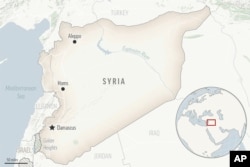U.N. investigators are warning the humanitarian crisis in Syria threatens to spiral out of control as violence increases and the collapsing economy keeps the population mired in poverty and hopelessness 13 years after civil war erupted in the country.
“As world attention and resources shift to other grave political or humanitarian crises, Syria descends further into a quagmire of misery and despair,” Paulo Pinheiro, chair of the U.N. Syria Commission of Inquiry, told the U.N. human rights council Friday.
In presenting the latest report by the three-member commission, Pinheiro painted a dark picture of a society that has fallen into an abyss of “multiple failures and missed opportunities.”
“We have seen 13 years of internal armed conflict brought about by the Syrian state’s violent and repressive response to peaceful demonstrations,” he said. “Our report to you documents continuing arbitrary detentions with state officials continuing to forcibly disappear, torture and ill-treat detainees in their custody.”
The report says that fighting has intensified along multiple front lines, as disparate military forces use heavy artillery to maintain territorial control and resort to intensified violence against their perceived political opponents.
It accuses these militias of committing a litany of human rights violations and abuses against the civilian population, increasing the fear “of a large-scale war” breaking out.
For example, the report says that in the northwest of the country, conflict between a Syrian terrorist organization, Hay’at Tahrir al-Sham, and some factions of the Syrian National Army continue to “arbitrarily detain, torture and disappear civilians and those perceived as political opponents.”
The report cites intensified fighting by Syrian government forces in the Idlib area of northwest Syria, where civilians have been killed, injured and maimed “in unlawful attacks” with cluster munitions in densely populated urban centers.
In the incidents investigated by the commission, the report finds more than 150 civilians, half of them women and children, were killed and injured by government forces. The vast majority were in indiscriminate ground attacks near frontline villages and towns “in violation of international humanitarian law.”
“Such attacks may amount to war crimes,” it says, noting that “airstrikes by Syria’s ally, Russia, again led to casualties.”
“Aerospace forces of the Russian Federation may have failed to take all feasible precautions to minimize harm to civilians, in violation of international humanitarian law,” authors of the report say.
Syria’s ambassador to the U.N. in Geneva, Haydar Ali Ahmad, responded to the report by calling the commission’s mandate into question and branding the commissioners as “nothing but tools designed to implement specific agendas” of certain Western powers.
“What is the benefit of such mandates when we are faced with a commission of inquiry whose task is not to investigate but establish the misleading Western narrative on the situation in Syria?” he said. “Regrettably, it has betrayed the principles of impartiality, objectivity, independence and transparency.”
Commission Chair Pinheiro expressed particular alarm at “the heightened regional tensions stemming from the conflict” in Israel and Lebanon.
“These have led to intensified Israeli airstrikes — and last week a raid into Syria —targeting Iranian officials and militias across Syria, causing civilian casualties on at least three occasions,” he said. “Iranian-affiliated groups and the U.S. have stepped up attacks on each other in northeast Syria since the start of the Gaza war.”
He warned of the dangers to the system of international law itself “if the member states charged with upholding it are seen to be failing in this obligation,” a sentiment shared by Geir O. Pedersen, U.N. special envoy for Syria.
In a briefing Friday to the Security Council, Pedersen said he was deeply alarmed at the reports of “a large number of communication devices exploding across Lebanon as well as in Syria … resulting in casualties, including children, and subsequent Israeli airstrikes on Lebanon and Hezbollah rocket fire into Israel.”
“There is a clear and present danger of a wider regional war that drags the Syrian people into its crosshairs,” he said.
Pinheiro cited multiple other ongoing military operations in different parts of Syria by various military groups intent on seizing land, extorting money and other possessions for personal gain, regardless of the costs.
“Civilians continue to be killed on a daily basis in a senseless war that has left the country economically and politically broken, dramatically eroding the social fabric,” he said.
The United Nations reports more than 306,000 civilians have been killed in Syria since civil war broke out in 2011, and nearly 14 million have been forcibly displaced, 7.2 million inside Syria and 5.6 million as refugees in neighboring countries, across Europe and beyond.
The U.N. Office for the Coordination of Humanitarian Affairs reports 16.7 million people, or 3 in every 4 people in Syria, need humanitarian assistance. Of those, 13 million face acute food insecurity, and upwards of 650,000 children under the age of 5 are stunted from severe malnutrition.
“Living conditions are increasingly desperate, and we note the failure of the international community to fund more than a quarter of the U.N.’s [$4.9 billion] 2024 humanitarian response plan,” Pinheiro said.
“Overall, Syria’s GDP has shrunk by more than half since 2011, a result of the combined effect of destruction of infrastructure and economic networks, forced displacement of more than half the population, predatory practices and rampant corruption,” he said.



